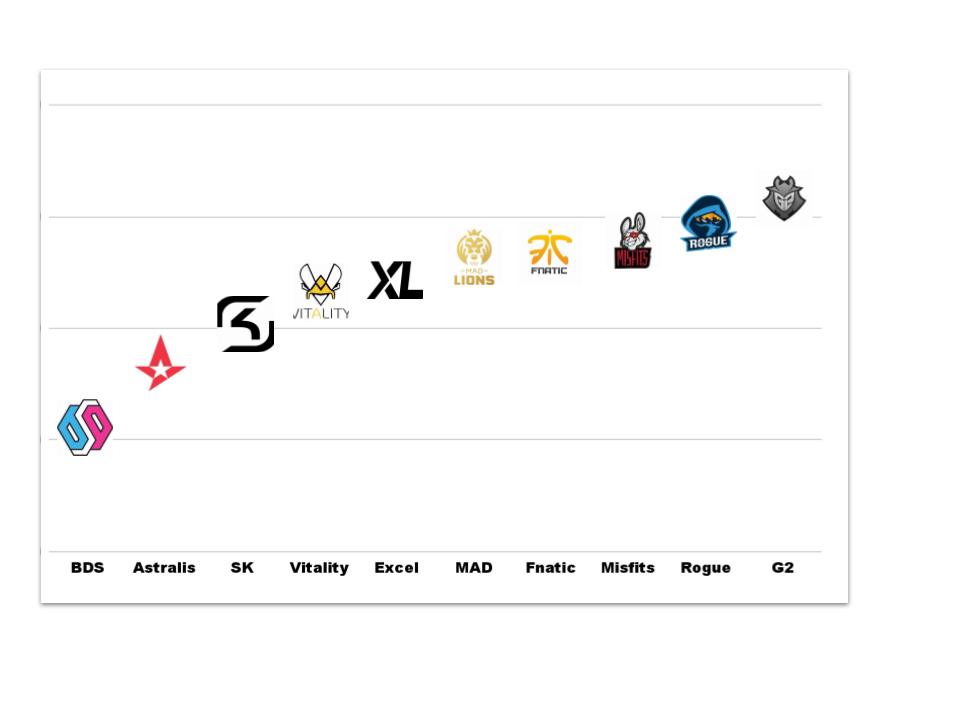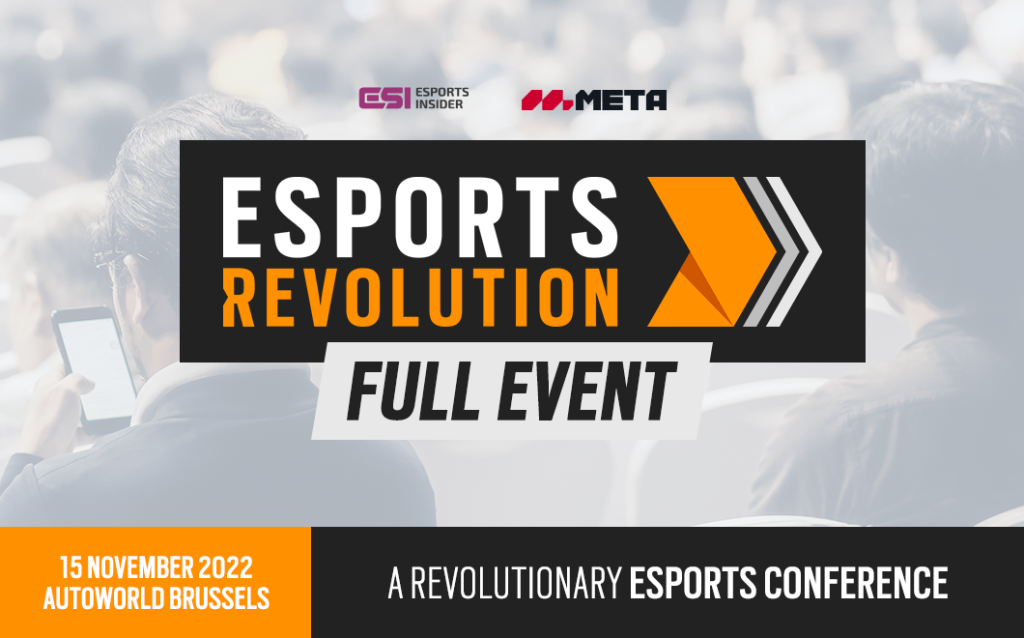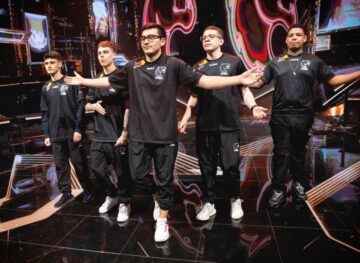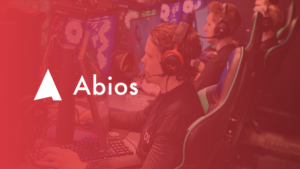Dr.-Ing. Notger Heinz is Principal Data Scientist at Bayes Esports and part of the data science team that ensures Bayes has the best predictions and data services in the esports realm. He writes for Esports Insider to untangle the relationship between the science of statistics and art of storytelling.
After over a month of action across North America between 24 of the best teams in the world, underdogs DRX defied the odds to win the League of legends World Championship 2022. Yet whether or not the 24 competing teams actually were the ‘best’ representatives from their respective regions is up for debate.
Let’s take the European league — the League of Legends European Championship (LEC) — for example, where whether a team makes it to LoL Esports’ biggest event or not is determined by a double-elimination knockout tournament at the end of the season. Win and you’re in; lose and you’re out.
The better a team performs throughout the entire season, the easier your competition is supposed to be, and the more chances you might possibly have at securing your ticket to Worlds. Nonetheless, what this means for the majority of teams is that whether or not they will be attending Worlds depends on one, or at best two, series of matches.
One bad day can end your season, and a team that otherwise has performed well up to that point can miss out. A cruel, yet exciting format that rewards teams for being good when it truly matters, but also one that has the potential to cause major upsets. One that can potentially result in an overall ‘weaker’ team making it to one of esports’ grandest stages.
But how do we assess which teams are considered ‘strong’ or ‘weak’ anyway?
We developed an algorithm at Bayes Esports that can rate a team’s strength with the recency of their performances being taken into consideration. The hotter a team currently is and the more recent their wins have been, the stronger it’s deemed.
By looking at a team’s match history and using Bayesian methods — a technique for statistical inference, and inspiration for our company’s name — we get a score that represents an estimate of the team’s strength as well as a score that is an indication of how precise that estimate is, or as we call it, an uncertainty.
As ours is a Bayesian algorithm, this uncertainty determines the speed at which the estimation is updated if given new information, as well as the basic win chance to begin with. For example, if a team used to be good but stopped playing for six months, they’d have a high score but high uncertainty, so we’d rate their chance of winning lower than if they had low uncertainty. We also adjust our rating of the team if new information shows our previous rating was overly generous.
In essence, both parts together form a picture of a team’s current situation: How good we think they are, and how sure we are. This is what that picture looks like taken at the end of the LEC Summer Playoffs.

The eagle-eyed LoL fans have probably already spotted two interesting differences between our calculated standings and the actual seedings for the European teams at Worlds. First and foremost, we still have G2 Esports at the top of our list despite them losing the LEC Grand Final 0-3 to Rogue. This 0-3 loss, however, was offset by the 3-0 win G2 had over Rogue in the winner’s semi-final of the LEC playoffs, turning their most recent head-to-head into a 3-3.
With Rogue’s poor end of the season on top, losing to the bottom three teams — Team BDS, Astralis, and SK Gaming — shortly before the playoffs began, we had them ranked even lower before their championship run eventually elevated them to second place on our list.
The other difference is the ranking of Misfits Gaming in third place and Fnatic finishing fourth in our list. This might look odd, considering the poor playoffs performance of Misfits, losing to both G2 and Fnatic to miss out on qualifying for Worlds. Yet while both teams finished the season with 10 wins and 8 losses, Misfits Gaming’s wins were consistently against higher-rated opponents while Fnatic, on the other hand, almost exclusively won against lower-rated teams and lost vital matchups before playoffs began. This meant that we evaluated Misfits as high as second place before playoffs, with their playoffs performance then putting them very close to the level of Fnatic.
Does that mean that Misfits severely underperformed, and that we actually expected them to make a better run through the playoffs and represent Europe at Worlds, only for them to fall at the very last hurdle? Kind of, but not really.
What we have are estimates and probabilities. Mean values that move between 0 and 1 that we would expect if the same situation was played out a million times over. If we replayed the playoffs over and over again, we would expect Misfits Gaming to, on average, perform better than they did.
In the real world, however, we do not get an average. We only get one run. A team either wins or they don’t. 0 or 1 with nothing in between. Misfits losing out was maybe not the most likely outcome, according to our calculations, but it was also not unlikely. Anything can happen and that is the true nature of knockout games.
That is also what makes esports so exciting. Even in our strictly mathematical evaluations, the strengths of the competing teams in Europe remained very close together. On any given day, any team can beat any other given team. There are no guarantees in esports, so every game is worth watching.
These evaluations of strength and win probability aren’t rules written in stone that state which team will come out on top and how matches are going to end. They are simply glimpses into what we as esports fans can expect. Getting a feel for which team would be considered favourites in any given matchup and how far apart we believe the competing team’s strengths to be allows us to look at the matches played from a different perspective.

They allow experts, whether on-air or in post-game analyses, to tell stories that go far beyond the thirty to forty minutes of action on the Rift and define favourites and underdogs. They provide the foundation for which team takes which role in the story told throughout the game. Who do we expect to be David and Goliath, or do we expect an Unstoppable Force to meet an Immovable Object?
It’s these stories that can make any match in esports so emotional and exciting to watch. Stories that are not limited to a specific region or language, and that should not only be told by an exclusive group of storytellers.
What we focused on here were the teams and results of the LEC, the league that is closest to our home. But through a publicly available website and an API that lets people access these kinds of results themselves, we want to enable others to tell their own stories of LoL Esports.
We are not storytellers here at Bayes Esports. We just provide others with all the tools they need to become one.
From our sponsor Bayes Esports
- amazon prime gaming
- axie infinity
- Bayes Esports
- Casino Games
- coingenius
- commercial
- data
- EA Sports
- Esports data
- esports data storytelling
- Esports Insider
- Evil Geniuses
- Features
- Gaming
- gaming headset
- gaming pc
- insights
- Latest News
- league of legends
- League of Legends Esports
- League of Legends European Championship
- League of Legends World Championship
- LEC
- lol worlds
- madden nfl
- MOBA
- Nintendo
- Online casino games
- pc games
- plato
- plato ai
- plato data intelligence
- plato game
- plato gaming
- platodata
- platogaming
- playstation
- prime gaming
- Team SoloMid
- xbox
- zephyrnet













